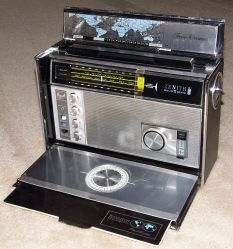The true story of pirate radio is a complicated fight over the airwaves. Maybe you have a picture in your mind of some kid in his mom’s basement playing records, but the pirate stations we are thinking about — Radio Caroline and Radio Northsea International — were major business operations. They were perfectly ordinary radio stations except they operated from ships at sea to avoid falling under the jurisdiction of a particular government.
Back then many governments were not particularly fond of rock music. People wanted it though, and because people did, advertisers wanted to capitalize on it. When people want to spend money but can’t, entrepreneurs will find a way to deliver what is desired. That’s exactly what happened.
Of course, if that’s all there was to it, this wouldn’t be interesting. But the story is one of intrigue with armed boardings, distress calls interrupting music programs, and fire bombings. Most radio stations don’t have to deal with those events. Surprisingly, at least one of these iconic stations is still around — in a manner of speaking, anyway.
Why a Ship?
In 1964, Ronan O’Rahilly decided there was a market in the United Kingdom for rock music. O’Rahilly — an Irish musician manager — was frustrated he could not get airplay for artists he represented. The major record labels had control of the limited amount of rock programming allocated on government-sanctioned stations. His solution was to start his own radio station. However, in the UK only the government — the BBC — were permitted to broadcast radio programs. Britain didn’t open up the airwaves to domestic competitors until 1973. If O’Rahily were only going to do shortwave, he might have opened a station anywhere, but the first broadcasts were on the AM band (1520 kHz) so the transmitter needed to be close to the intended audience.
The solution was to put the transmitter on a ship and keep it in international waters near the intended audience. This wasn’t a new idea. Stations operating outside the law sprung up almost as soon as there were laws. Radio Mercur was the first known case of high-seas broadcast radio, operating off the coast of Denmark in 1958. Even some legitimate broadcasters — like the Voice of America — used a ship to put transmitters near the Eastern Bloc as early as 1952. Anchored off the coast of Greece, they had the Greek government’s permission to be there. So despite Moscow’s feelings about the matter, they were not technically pirates.
However, the situation in the UK was even more complex. The government required, at that time, a license fee for a radio receiver. Part of that license prohibits the licensee from listening to unauthorized — well, perhaps unauthorised, since it is English — broadcasts. So, in theory, just listening to a radio station in another country like the popular Radio Luxembourg, was technically against the law. This wasn’t really enforceable. As an aside, the radio set license ended in 1971, but there is still a license required for TV …read more
Source:: Hackaday

